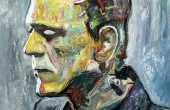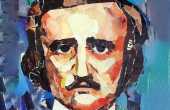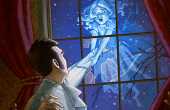Sam
Contributing writer for The Artifice.
Correspondent III
- Plebian Penman
- Common Writer
- Aristocratic Author
- Lurker
- Pssst
- Hand Raiser
- Vocal
- Outspoken
- Extrovert
- Sharp-Eyed Citizen
- Town Watch
- Detective Deskman
- Penman Patrol
- Forensic Fiend
- Well Read
- Chaptered Mind
- Article of the Month
- ?
- Articles
13 - Featured
13 - Comments
296
- Ext. Comments
127 - Processed
141 - Revisions
137
- Topics
26 - Topics Taken
8 - Notes
34
- Topics Proc.
263 - Topics Rev.
139
- Points
6287 - Rank
11 - Score
4471
Latest Articles
Latest Topics
The Outsiders' Impact on YAYoung adult fiction (YA) is immensely popular today, for both teenagers and adults. But the category itself is only very young. S.E. Hinton's 1967 novel, The Outsiders, is popularly considered the first ever work of YA fiction. So, what precedent did this novel set for the rest of this category of fiction? What aspects of Hinton's novel are now staples in YA? An example is the discussion of weighted and important topics in a manner that is consumable by teenagers (The Outsiders discusses the harsh realities of every day class divisions). Or, like many YA books nowadays, Hinton's protagonist is characterised as an outcast, or 'special' (he even has an unusual name, Ponyboy, something many other YA protagonists have). Discussing a few YA texts that share similarities with The Outsiders will help to show the aspects of the original text that have become commonplace in the young adult category.
|
The Novella, a forgotten medium?I propose an article that looks at novellas. The article could describe first what they are, explaining the length and conventions, explore how they differ from both a novel and a short story. It could be worth looking into the history of this medium, when were they most popular and why? What were the first texts classified as novellas and what purposes did they serve? Perhaps offer suggestion as to why they are not big in the literary scene today. If so desired, contrast the good by offering examples of novellas that are perceived as not good and offer reasons as to why. Are they not given the space to be fully developed? Does its brevity mean it is missing something? Use this analysis to draw conclusions regarding the novella's place in literature including, if possible, whether this medium is likely to regain popularity or merely survive as a medium at all.
|
Narrative Distance in Life WritingLife writing (memoirs, essays, autobiographies and biographies, auto-theory, etc.) is inherently personal in nature. These writings focus on personal stories that can be confronting for the reader to read, AND for the writer to write. They intend to communicate some form of personal, human truth. But what role does narrative distance play in these works? Does life writing have to be first-person perspective that recounts events exactly as they transpired? Or, can a writer distance themselves from the writing and still achieve the same intimacy of life writing? A range of texts could be discussed here; texts that approach life writing very differently. Some examples could include clear-cut autobiographies written in the first-person (of which there are many), or works of fiction where a made-up character represents a real person (semi-autobiographical works, like Jane Eyre or Frost in May). A more out-there example could be cook books — these often express personal stories under the guise of recipes. Travel writing, too, can often be an inadvertent style of writing about the self whilst maintaining some narrative distance.
|
The Morals of Video Game ViolenceVideo games that require or encourage violence are prolific. There have been countless studies on whether the violence of such games has psychological impacts. Using a selection of games that involve violence, consider whether it is morally wrong to 'physically' harm a virtual character. Explain why. You could argue either side of this argument, or argue that the moral implications differ depending on the situation. For example, perhaps some forms of violence are more acceptable than others (e.g. fighting vs. murder). Or, maybe there's a difference between harm the game tells you to inflict to complete an objective, and the harm you choose to inflict but has no bearing on your completion of the game. Ensure sound justifications are provided for whichever stance you take. Relevant philosophical discussion would complement this topic well.
|
Published | What in the world was Roland Barthes on about in 'A Lover's Discourse'?In 1977, Professor Roland Barthes released his book 'A Lover's Discourse: Fragments'. One point he seems to be making is that our own experiences of love are dictated to us by the discourse of love within our culture. It is through this language that our expectations of what love should feel like are formed. Therefore, after breaking down Barthes' text and some key fragments/ideas, this article could look into examples of popular culture and how they have influenced modern ideas of love. The romance genre in film, tv, literature, and even music are prevalent. Everything from Shakespeare's plays to Romantic Comedies to Disney movies. If, indeed, you deduce other claims worth discussing in the text, find popular or contemporary examples to suit that also! |
The Monk Vs. The ItalianIn 1796, Matthew Lewis published the novel 'The Monk'. An early example of 'masculine', or horror gothic, it covers many shocking and depraved themes.
|
Film Adaptations Better than the BookIn almost every 'which is better, book or movie?' debate, the book wins. For a plethora of reasons, from intense detail to unique character-building, books are almost always dubbed better than their adaptations. But what about the film adaptations that are better than their original book? Do they take away the difficult language of a book to make an important story more accessible? Are the characters better rounded and more realistic? Does the film cut out unnecessary details that are included in the book? Is there a changed detail that improves a film — different setting, different main character, different conclusion, perhaps. Is it simply a case of visuals portraying the content better than words can (say, an intense action sequence for example). There could be ANY number of reasons and ANY number of films to be discussed.
|
Published | Historical Texts that Captivate ReadersWriters of history usually receive the bad reputation of being boring and uninspired storytellers, for the events of history aren't designed to be page-turners. On the other hand, there are histories that embellish for the sake of storytelling but compromise accuracy. This is also criticised. Thus, an article exploring histories that are both accurate and educational whilst still captivating audiences would be a great read. Offer examples of good histories, and give reasons as to why they are effective as both works of popular literature AND educational history resources. Jung Chang's Wild Swans or Ten Days That Shook The World by John Reed are two good examples. There are some wonderful examples of written history that tend to get lost amongst the 'boring' stuff. So an article highlighting examples of good history, and analysing why that is, would be interesting and perhaps even helpful for those looking to write public history.
|
Latest Comments
| Apex and Abyss: A Thematic Analysis | |
It did take a while, but it also gave me an excuse to listen to the albums over and over and that is nothing to complain about! | Apex and Abyss: A Thematic Analysis |
I’m yet to listen to anything else by them that isn’t these two albums, but each of these lists are making me think I should! | Apex and Abyss: A Thematic Analysis |
Thank you! I enjoy the albums on their own, but I agree, listening to them back to back is necessary to really appreciate the storytelling! | Apex and Abyss: A Thematic Analysis |
I appreciate literary criticism that is unafraid to point out how unlikeable and not at all admirable literally every character in this book is. The fact that Fitzgerald was able to impress that Gatsby idealises Daisy whilst simultaneously making sure readers do not idealise her is talent I don’t think I could fathom having. Interesting article! | Daisy Buchanan: Love, Folly and Money in The Great Gatsby |
Firstly, I just want to say that I really like this article! The way you have written it is wonderful and engaging. The accompanying images are fun and light. Truly good work. | A Short Guide to a Writer's Imaginary Critics |
I spent a bit of time studying Frankenstein during my degree, and this is an angle I have not explored. Great read! | Victor Frankenstein and his Daemon: A Study of their Dialogue |
@abba I agree with the point you make here completely! The tastes of women, especially if they are young, are dismissed as inherently less valid. That is why the “not like other girls” mentality has become something so many girls try to adopt, because we have to in order to be taken seriously. @Michel Sabbagh, good writing as always. | The Storytelling Layers of Literary Merit |





That is exactly right! I think that was a really beautiful point for the saga to end on.